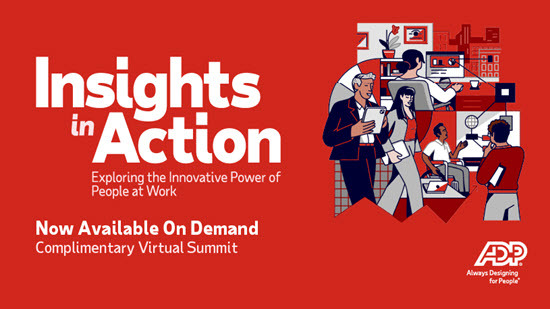Essential Leadership Traits for Modern Business Success
Part of a series | Insights in Action Series

In today's rapidly evolving business landscape, effective leadership relies on striking a balance between technological integration and a human-centric approach.
Kicking off the recent Insights in Action 2025 virtual summit was a conversation between Adam Grant, organizational psychologist at Wharton, bestselling author of Think Again, and host of the podcasts WorkLife and Re:Thinking, and Paul Boland, chief human resources officer at ADP. The session titled "Balancing Human Consideration with the Speed of Innovation" offered valuable leadership insights for today's people managers.
Leaders face the complex task of fostering a culture that embraces innovation while ensuring employee well-being and motivation. Striking this balance is crucial for sustainable growth and long-term success. Navigating this environment demands leaders who can adeptly manage the tension between achieving immediate results and building meaningful connections with their teams.
Essential leadership traits for modern times
Effective leadership today requires continuous adaptation and learning. Traditional experience and knowledge are no longer enough. Therefore, leaders need agility and a willingness to try new methods themselves, while fostering an environment where failure is viewed as a learning opportunity. This culture of experimentation drives innovation and helps teams navigate technological uncertainties.
"I think there's a case to be made for giving people do-overs if we really want to identify their ability to use their skills to learn," Grant said.
"There's some evidence from the U.S. Army showing it is not how well somebody does in a first interviewer assessment that foreshadows their capability. It's their progress from their first one to their 'do over' that demonstrates whether they have the motivation and ability to grow. I think too often we write people off when the first interview doesn't go well or when an initial assessment is not up to our standard, as opposed to, 'Let's give them the feedback and see if they can travel the distance.' Those are the people I want to hire and reward because they are the people who'll move us forward."
Grant also said that the term "soft skills" needs to be rebranded as "character skills." They include generosity, humility, integrity, creativity, curiosity, and wisdom. These skills are crucial for building strong team relationships and fostering collaboration. Grant also points out that as technology advances, these human-centric skills become even more valuable because machines cannot replicate them. Leaders who prioritize these traits will be better equipped to guide their organizations through change and uncertainty.
Organizations should not only shift from measuring current abilities to identifying motivated learners, but also provide opportunities for skill development and growth. Investing in continuous learning helps ensure an agile workforce that's capable of tackling new challenges, enhancing individual performance, and contributing to organizational resilience.
"I think actually teaching people to become better learners is going to become a centerpiece of training," Grant said. "And I think ultimately we'll end up rewarding and promoting more the people who learn and who teach others."
Growth, technology and balanced leadership for organizational success
Integrating technology requires a human-centric approach. Technological advancements should enhance efficiency and innovation without compromising employee well-being. Therefore, leaders must use technology to enhance the work experience while fostering a culture that supports and empowers employees. Balancing technological goals with human considerations ensures sustainable growth.
Grant relayed that successful leadership involves empathy, authenticity, and a results-driven mindset. Leaders must strike a balance between being results-oriented and empathetic, avoiding extremes. For example, a leader who focuses solely on results may lose team trust and loyalty, while an overly empathetic leader may struggle to achieve organizational goals. The key is finding a middle ground where both empathy and results are prioritized.
Frame feedback as a development tool, not an attack
Younger or inexperienced employees often struggle to handle negative feedback and constructive criticism. Many become defensive. Leaders can help prevent or reduce that tendency by setting clear expectations and communicating to their team members that feedback is intended for growth and improvement. Creating that type of culture fosters continuous learning and improvement, helping teams develop resilience and adaptability.
"We need to set the relationship up where it's clear that we're not attacking," Grant said. "So often when we give feedback, people put their guard up because they want to feel successful."
Grant admires Admiral Bill McRaven's practice of keeping a bowl of candy on his desk to encourage informal conversations, saying that it exemplifies an effective way to build relationships. Sometimes an analog method can surpass digital alerts in fostering connections.
How to foster a future-ready culture
The future of work requires a balance between technological innovation and human-centric leadership. Fostering a culture of continuous learning and prioritizing character skills are essential. Integrating technology with a human approach helps navigate modern business complexities, driving success and ensuring employees feel valued and motivated.
As artificial intelligence evolves, leaders must integrate these tools thoughtfully, encouraging innovation to stay competitive. Striking the right balance builds strong, cohesive teams that achieve goals while maintaining a positive work environment.
Launch this and the other summit sessions on demand anytime: Insights in Action 2025




